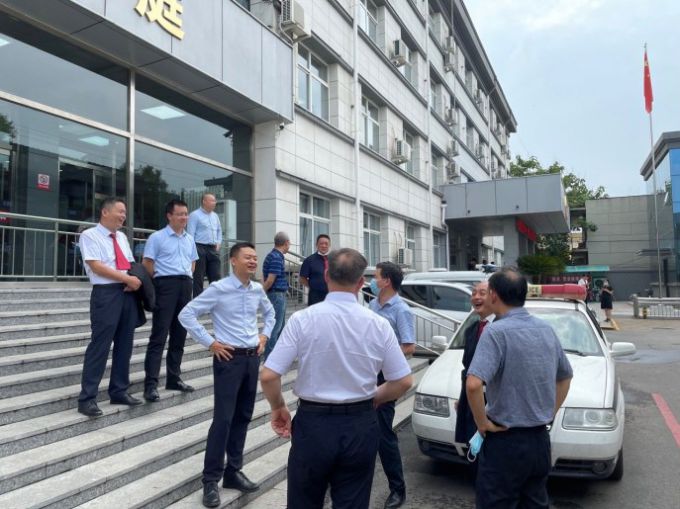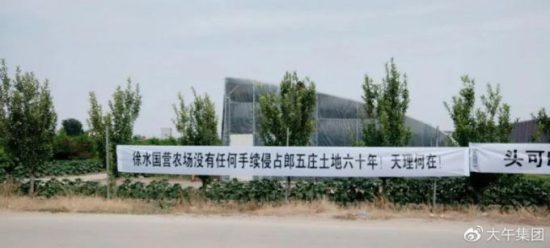2021年7月16日上午9时,大午案第二日庭审继续。
上午主要是各被告人对庭前会议决定发表意见,公诉人重点回应了被告人及辩护人提出的排除非法证据申请,辩护人再次补充发表意见。下午合议庭仍以“无必要”“无非法取证”为由驳回全部申请,随后进行对“聚众冲击国家机关罪”的法庭调查环节。
一、生不如死的“指居”,无法启动的“排非”
大午案中曾有七名被告人被指定居所监视居住,在此期间他们遭受了残酷的非人待遇。其他被告人亦提供了相关线索,向法庭提出排除非法证据申请。
1.孙大午:“指居期间,我苦不堪言、生不如死!”
在庭审过程中,孙大午自述:“在监视居住期间,我曾经因为苦不堪言、生不如死的待遇,要求到看守所去,我为此绝食了三天。我要求看看习主席的《社会主义思想三十讲》,因为大午集团就是走共同富裕的社会主义道路,但最后请示领导,又不让看。直到正月他们上班了,才给我放了一小时的风。三个半月,我第一次看见太阳”。
2.孙三午:“指居期间,我瘦了24斤,5天没有解大便,只求送我去看守所!”
孙三午(孙志华)自述:“所有笔录都是在监视居住的房间和我说好,先对好了口供,再戴上头套去执法办案中心对口型。在监视居住期间,我们得到的待遇是非人待遇,真是生不如死。160天我体重少了24斤,5天都没有解大便,后来我得了疝气,越来越严重,但至今也没让我做手术。在那里面,人就是没有希望的。他们让我签什么就签什么,只求赶紧送我去看守所”。
3.孙萌:“他们向我推荐其他企业,接管大午集团!”
孙大午长子、大午集团董事长孙萌自述:“我被指居之后,领导说大午集团需要有人经营,给我推荐了几家企业,让他们接管集团。我说都不是一个行业,怎么能接管,从企业长远发展角度,应该给我父亲取保候审。结果领导很生气,摔门而去。后来他们给我承诺,十天半个月我就能出去。所以,很多事情都是在监视居住的地方,把台词背好,再去做笔录。现在给我量刑建议是16年,我被骗了、太委屈了,现在给我定罪的都是我自己的假笔录,要排除这些证据”。
4.孙福硕:“我被拷在审讯椅上30个小时,他们说我不配合,要送我去指定居所监视居住!”
孙大午次子孙福硕自述:“我不知道什么是刑讯逼供,但抓我的时候把我拷在审讯椅上拷了30多个小时,我腿都肿了。他们都知道这些情况,提审我的警察明确说,别以为他们对付不了我,他们可以把我送去指定居所监视居住。我知道监视居住很可怕,我很害怕,我后续的笔录都是在这种压力下做出的”。
指定居所监视居住是刑事强制措施中较为轻微的一种,但大午案的被告人的感受却是“生不如死”。不具备居住条件的场所、实为“人质”的女眷、用尽威胁引诱欺骗手段的侦查人员,使得指居俨然变成“非法拘禁”。此种情形下所取得的被告人供述,当然是非法证据,依法应当排除。
面对被告人及辩护人坚决要求的排除非法证据申请,公诉人提供了被告人入所健康体检表、讯问合法性核查笔录,用于证明侦查活动的合法性。
然而入所健康体检表中并未体现当时孙三午已身患严重疝气的情况,且被告人所指非法取证并非严格意义上的肉刑,体检表不能排除存在非法取证的可能。至于讯问合法性核查笔录,不仅出现了同一位检察官在同一时间两次出现在核查现场的荒唐情况,同一位检察官在两份核查笔录中的签名笔迹也明显不同。公诉人对此解释为证据瑕疵。
合议庭据此表示,合议庭认为不怀疑存在非法取证情况,不启动排除非法证据的法庭调查程序。
二、绝不同意的取保,全部驳回的申请
大午案20名被告人中有一对四岁孩子父母,即柏雪松和李大红夫妇。2020年11月11日,公安机关当着两人四岁幼子的面,给两人戴上黑头套强行带走。随后将孩子丢给完全陌生的政府工作人员超过12小时,直至其他家属发现此情况。这个孩子从此不上学、不回家、不说话,至今仍在接受心理治疗。
大午案中还有一位名叫纪玮莲的被告人,因其原为孙大午助理,亦曾被指定居所监视居住。纪玮莲患有严重抑郁症,被采取强制措施以来,每日呕吐数十次,身体极度虚弱,处于精神崩溃边缘。
检察机关对柏雪松、李大红、纪玮莲三人的量刑建议均在三年以下,完全符合取保候审的条件。庭前会议中,检察机关也承诺将取保候审的办理作为第一要务处理,然大午案被告人至今无一人被取保。
庭审过程中几名被告人都表达了司法部门承诺落空的疑问,同时再次提出取保候审申请,李大红表示:“我不是态度不好,我是一个母亲”;纪玮莲提出:“我非常不理解,监视居住的场所和看守所都有360度摄像头,我的身心状况他们都能看见,为什么还是不能取保?”
大午案被告人明明符合取保条件,为何不取保?
这或许是无法回答却不言自明的问题。
对此,多名辩护人基于法律人最基本的职责、最起码的良善之心,恳请合议庭依法处理本案的取保候审申请。仝宗锦律师提出:“我也是一位四岁孩子的父亲,听见柏雪松、李大红夫妇的情况,真的很痛心”。周海洋律师指出:“虽然此前我的当事人也曾被动员解除律师,我也不是柏雪松、李大红的辩护人,现在发言可能引起我的当事人不满,但为了法律人的良心,即便下午就要被解除,我也要提出,李大红和柏雪松的取保要求是最起码的人道要求”。
下午开庭时,合议庭以“对证据合法性没有疑问、经评议认为没有必要”为由,驳回被告人及辩护人的全部申请,拒绝通知证人、侦查人员、鉴定人出庭,拒绝勘验指定监视居住场所,同时明确不再听取辩护人的意见。
三、有罪推定的办案思维,逐渐清晰的案件事实
法庭调查环节首先开始的是对“聚众冲击国家机关罪”的调查。
公诉机关指控:2020年8月4日孙大午组织大午集团员工及郎五庄村民围堵徐水区委、区政府和区公安局,共计200余人打条幅、喊口号、堵塞大门进出通道,致使徐水区公安局秩序严重混乱,损失严重。
公诉人向孙大午发问:“你所作的讯问笔录是否属实”?孙大午在案卷宗共计99份,除一份笔录外,其他98份笔录均形成于指定居所监视居住期间。孙大午及其辩护律师多次提出排除此部分非法证据申请,法庭虽未启动排非调查程序,但并不意味着此部分讯问笔录确定合法。而公诉人此种模糊不清、无具体指向的发问,意在让孙大午承认之前的有罪供述,同时切断后续再次提出排非申请的可能。因此,这种丧失客观公正立场、有罪推定式的诱导发问,引发辩护人及孙大午本人的反对。
公诉人继而表示:“因孙大午拒不回答,公诉人不再讯问”。
孙大午无奈直言:“你们要告诉我,你问的是我的哪些供述,你这样抽象地问我,我不知道怎么回答。我不是拒不回答,你们不能这么欺负我!”
后续,孙大午在回答辩护人发问时,指出其讯问笔录的虚假性问题:“我告诉侦查人员笔录记录有错,我没有说过凑够两百个人就拉倒,这不是我说的话,是警察说的。但侦查人员说改正不了,他们跟我说,我要是不弄点罪名,这个案子怎么了结?难道把我无罪释放了,把他们抓进来”?
通过向各涉案被告人的发问程序,所谓的“聚众冲击国家机关罪犯罪事实”逐渐清晰:
郎五庄村与徐水区国营农场就四家台地块的土地争议由来已久,郎五庄村将该地出租给大午集团后,为管理所需,大午集团建设了活动板房与围挡。2020年8月4日凌晨,国营农场在徐水区公安局派出的特警保护下,私自拆除了大午集团的板房与围挡。大午集团工作人员发觉后,要求农场方给个说法。公安局工作人员认为大午集团方拦截农场车辆行为违法,向集团工作人员喷射辣椒水、催泪弹,并进行推搡,导致集团多名工作人员受伤,送往大午医院紧急救治。
徐水区公安局此行为,引发大午集团群情激愤。集团员工遂自愿前往徐水区政府、徐水区公安局门口反映情况、表达追究伤人警察法律责任的要求。集团员工在区政府、公安局门口喊话,前后时间不超过半小时,区公安局即派员对喊话员工实施抓捕。员工们自始自终并未进入公安局或政府内部,所谓最为严重的“失控场面”也不过是当喊话员工发现公安局出面领导并非正职局长,担心无法公正处理诉求,而又“嚷嚷”了起来。
纵观全过程,大午集团方系基于自身权益受损、受到不公正对待而采取的表达委屈以希引起领导重视的行为,而且,事发原因系国营农场方毁坏大午集团价值1万8千元的建造物,可能已涉嫌故意毁坏财物犯罪。徐水区公安局对就在眼前发生的犯罪行为不予处理,反之还进行保护,对平等民事主体间截然相反的不公正态度是引发维权事件的根本原因。
下午庭审自13时30分开始,至晚20时结束,就聚众冲击国家机关一罪的向被告人发问程序已基本结束。而法庭发问程序中还显示出被告人当庭陈述与证人证言完全相悖的问题,对此,被告人表示愿意与证人当庭对质,也希望与证人当庭对质,还原案件事实。
庭审持续至晚19时,多名辩护人即提出建议休庭,要求保障被告人和辩护人的休息权利,审判长对此回应道:“你们反对无效,我说了算”。明日虽并非工作日,但庭审仍将于上午9时继续进行。
大午案法律团队
2021年7月16日

At 9 a.m. on July 16, 2021, the Dawu trial resumed for the second day.
In the morning, the defendants mainly expressed their opinions on the decision of the pre-trial meetings. The prosecutors mainly responded to the defendants and defense lawyers’ request to exclude illegal evidence, to which the defense lawyers provided supplementary opinions. In the afternoon, the collegial bench nonetheless rejected all applications to exclude evidence on the grounds of “lack of needs” and “no illegal evidence collection”, and then proceeded with a court investigation on the crime of “gathering a crowd to assault state organs.”
1. Life was worse than death under “Residential Surveillance at a Designated Location” (RSDL); court’s rejection of “the exclusion of illegal evidence”
In the Dawu case, seven defendants were placed under RSDL. During RSDL, they were subjected to cruel and inhuman treatment. The other defendants also provided relevant clues and requested the court to exclude illegal evidence.
1). Sun Dawu (孙大午): “Under RSDL, I suffered terribly, life was worse than death!”
During the trial, Sun Dawu stated: “During RSDL, I once requested to be transferred to the detention center because my treatment produced misery beyond words and life was worse than death. I went on a hunger strike for three days. I asked to read Chairman Xi’s “Thirty Lectures on Socialist Thinking” because the Dawu Group sought to abide by the socialist road of common prosperity. But when interrogators finally requested guidance from their leadership, they decided not to allow me to read it. It was not until the first month of the Lunar Year when they resumed work that they gave me an hour of yard time. I saw the sun for the first time in three and a half months.”
2). Sun Sanwu (孙三午): “Under RSDL, I lost 12 kilograms [about 26 pounds] and could not relieve my bowels for 5 days. I begged them to send me to the detention center!”
Sun Sanwu (孙志华) stated: “All the interrogation transcripts were agreed upon with me in the RSDL room. First, they made me confess, and then they put a hood over my head and took me to the law enforcement investigation center to synchronize my speech. The treatment we received under RSDL was inhuman. Dying was better than living. I lost 12 kilos in 160 days, and I did not relieve my bowels for 5 days. Later, I suffered a hernia, which became more and more severe, but as of yet I have not been allowed to undergo surgery. There is no hope under RSDL. I signed whatever they asked me to sign. I only begged them to send me to the detention center as soon as possible.”
3). Sun Meng (孙萌): “They recommended other companies to me to take over Dawu Group!”
Sun Dawu’s eldest son and chairman of Dawu Group, Sun Meng, said: “After I was placed under RSDL, an official came and said that Dawu Group needed someone to operate it and recommended several companies to me to take over the group. I said that those companies were not even in the same industry, how could they take over Dawu? From the perspective of the long-term development of the company, my father should be granted bail. As a result, the official was very angry and slammed the door as he left. Later they promised me that I would be released in ten days or half a month. Therefore, many things were scripted in the RSDL room where I was made to memorize their lines and then record the interrogation transcripts with them. Now their suggested sentencing is 16 years in prison. I was deceived and wronged. The current accusations against me are all based on my own faked transcripts, and this evidence must be excluded.”
4). Sun Fushuo (孙福硕): “I was handcuffed to the interrogation chair for 30 hours. They said that if I refused to cooperate, they would place me under RSDL!”
Sun Dawu’s (孙大午) second son, Sun Fushuo, said: “I don’t know what forced confession made under duress means, but after I was arrested, they handcuffed me to the interrogation chair for more than 30 hours, until my legs were swollen. They all knew what they were doing. The police interrogators made it clear: Don’t think we can’t make you submit; we can place you under RSDL. I knew that RSDL was terrible, and I was scared. The subsequent interrogation transcripts were made under such duress.”
By book, Residential Surveillance in Designated Locations is a relatively minor form of criminal detention measure, but the experience of the defendants in the Dawu case made clear that under RSDL “death is better than life”. Given that these places are without humane living conditions, that female relatives are held as de facto “hostages”, and that investigators used threats and deception for their aims, RSDL has in fact become “illegal detention”. The defendants’ confessions obtained under such circumstances is of course illegal evidence and should be excluded in accordance with the law.
In response to defendants and defending counsel’s insistence on the exclusion of illegal evidence, the prosecutor provided the defendants’ health check-up forms and documents verifying the legality of the interrogation transcripts to prove the legality of the investigation activities.
However, the physical examination form did not reflect that Sun Sanwu (孙三午) was suffering from a severe hernia at that time, and the defendants’ alleged illegal evidence collection was not strictly from corporal punishment. The physical examination form thus cannot rule out the possibility of illegal evidence collection. As for the transcripts verifying the legality of the interrogation, not only did the same prosecutor appear absurdly at two inspection sites at the same time, but the signatures of the same prosecutor in the two verification transcripts were also obviously different. The prosecutors interpreted this as a flaw in evidence.
Based on this, the collegial bench stated that the panel did not believe there was any suspicion of illegal evidence collection and did not initiate a court investigation procedure to exclude illegal evidence.

2. Bail is categorically denied; all requests by defendants and defense lawyers are dismissed
Among the 20 defendants in the Dawu case are the parents of a four-year-old child, Bai Xuesong (柏雪松) and Li Dahong (李大红). On November 11, 2020, the public security officers forced black hoods on the two and took them away in front of their four-year-old son. The child was then left to government workers who are complete strangers for more than 12 hours, until relatives discovered the situation. The child has since then not gone to school, refused to return home or speak up, and is still receiving psychotherapy.
Another defendant in the Dawu case is Ji Weilian (纪玮莲). A former assistant to Sun Dawu (孙大午), she was also placed under RSDL. Ji suffers from severe depression. After being taken into custody, she has been vomiting dozens of times a day. She is extremely weak and on the verge of mental breakdown.
The prosecutors’ recommendations for sentencing Bai Xuesong (柏雪松), Li Dahong (李大红), and Ji Weilian are all less than three years, which fully meets the conditions for bail pending trial. In the pre-trial meetings, the prosecutors also promised to process the bail requests as their first priority. However, none of the defendants in the Dawu case has been released on bail so far.
During the trial, several defendants questioned the failure of the judicial authorities to uphold their promises, at the same time filing another application for bail pending trial. Li Dahong (李大红) said: “It’s not that I have a bad attitude, I am a mother.” Ji Weilian pointed out: “I don’t understand it: the RSDL room as well as the detention center all have 360-degree rotating cameras. They can clearly observe my physical and mental condition. Why can’t I be granted bail?”
The defendants in the Dawu case clearly met the conditions for bail pending trial, why have they not been granted bail?
Perhaps this is an unanswerable, yet self-evident, question.
In response to this, a number of the defending counsel, based on the most basic duties of legal professionals and the most basic kindness of a human heart, urged the collegial bench to process the application for bail pending trial in this case in accordance with the law. Lawyer Tong Zongjin (仝宗锦) said: “I am also the father of a four-year-old child. My heart hurts when I hear about the situation of Bai Xuesong and Li Dahong.” Lawyer Zhou Haiyang (周海洋) pointed out: “Although my client had previously also been persuaded to dismiss his counsel, and my opinion may irritate my client because I’m not the defending counsel of Bai Xuesong and Li Dahong, for my conscience as a lawyer, even if it means I may be dismissed in the afternoon, I have to raise the point that Li Dahong and Bai Xuesong’s request for bail is the minimum requirement for humane treatment.”
At the hearing in the afternoon, the collegial bench rejected all the applications of the defendants and defending counsel on the grounds that “there is no doubt about the legitimacy of the evidence and [what’s requested] is deemed unnecessary upon further deliberation.” The bench made clear its refusal to notify witnesses, police investigators, and appraisers to appear in court; to inspect designated residential surveillance sites; and at the same time made clear that the defending counsel’s viewpoints would no longer be heard.
3. While the court handles the case with a presumption of guilt, the facts of the case are gradually becoming clear
The court began its investigation first on “the crime of assembling a crowd to attack state organs.”
The prosecutors allege: On August 4, 2020, Sun Dawu (孙大午) organized employees of Dawu Group and villagers of Langwuzhuang (郎五庄) to block the seat of Xushui District Communist Party Committee, Xushui District government seat, and the Xushui District Public Security Bureau. A total of more than 200 people displayed banners, shouted slogans, and blocked the entrance and exit passages of the gates, causing serious chaos in the Xushui District Public Security Bureau and serious losses.
The prosecutors asked Sun Dawu: “Are the transcripts of your interrogation true?” There are a total of 99 interrogation transcripts in Sun Dawu’s (孙大午) case file. Except for one transcript, the other 98 transcripts were all formed during the period of RSDL. Sun Dawu and his defense lawyers have repeatedly applied for the exclusion of this illegal evidence. Although the court has not initiated the investigation procedure for evidence exclusion, it doesn’t necessarily mean that the legality of these interrogation transcripts is confirmed. The prosecutors’ vague and non-specific questioning was intended to lead Sun Dawu to recognize his confessions of guilt, while at the same time to cut off the possibility of filing evidence exclusion applications again [by Sun and his lawyers]. The defending counsel and Sun Dawu himself opposed such manner of questioning by prosecutors that is neither objective nor impartial, that was conducted under the presumption of guilt.
The prosecutors then said: “Because Sun Dawu refuses to answer, the prosecution will not carry out further questioning.”
Sun Dawu said helplessly: “You have to tell me which of my confessions you are asking about. If you ask me so abstractly, I don’t know how to answer. I am not refusing to answer, you cannot bully me like that!”
Later, when answering the defenders’ questions, Sun Dawu pointed out the falsehood of his interrogation transcripts: “I told the investigators that the transcripts were wrong. I had never said that if you get two hundred people together, it will be enough. This is not what I said; the police said that. But the investigator said that they couldn’t make corrections. They told me, ‘if we fail to establish your crimes, how are we going to have a case? Do you expect us to set you free innocent of any crime, and arrest ourselves?’”
Through the questioning procedures of the defendants involved in the case, the so-called criminal facts of “the crime of assaulting state organs” gradually became clear:
Langwuzhuang Village and the Xushui District State Farm (徐水区国营农场) had a long-standing dispute over land in the Sijiatai plot. After Langwuzhuang leased the land to Dawu Group, the Dawu Group built mobile houses and enclosures for management needs. In the early morning of August 4, 2020, under the protection of special police sent by the Public Security Bureau of Xushui District, the state farm covertly demolished the houses and enclosures of Dawu Group. After the Dawu Group staff found out, they asked the farm to give an explanation. The Public Security Bureau personnel believed that the Dawu Group’s interception of farm vehicles was illegal. They sprayed pepper spray, tear gas, and forcibly shoved the Group’s staff, resulting in injuries to several staff members who were rushed to Dawu Hospital for emergency treatment.
The actions of Xushui District Public Security Bureau caused great indignation in the Dawu Group. The employees of the group voluntarily went to the Xushui District Government and the Xushui District Public Security Bureau to report the situation and express their request for the police who had injured staff members to be held accountable. Group employees shouted at the gates of the district government and the public security bureau, lasting no longer than half an hour. Yet the district public security bureau dispatched personnel to arrest the shouting employees. The employees never entered the Public Security Bureau or the government buildings. The so-called “scene of chaos” began only when the Dawu employees found out that the representative appearing before them on behalf of the Public Security Bureau was not the bureau chief, and worried that their demands would not be considered fairly, they began to “shout loudly” again.
Throughout the whole process, the Dawu Group’s behavior was based on the damage to its own rights and unfair treatment. It was a behavior that expressed grievances and hoped to attract the attention of the government leaders. Moreover, the cause of the incident was that the state-run farm destroyed structures belonging to the Dawu Group worth 18,000 yuan, and may have been guilty of premeditated purposeful destruction of property. The Public Security Bureau of Xushui District did not prosecute the crimes that occurred right in front of them, and instead protected the perpetrators. The unfairness towards Dawu employees and the diametrically opposite attitudes towards equal civil subjects is the fundamental cause of the Dawu employees’ rights defense incident.
In the afternoon, the court hearing started at 13:30 and ended at 20:00. Procedural questioning of the defendants for the crime of assembling a crowd to attack state organs had basically ended. The court questioning procedure also revealed that the defendants’ statements in court were completely contradictory to the witness testimonies. In this regard, the defendants expressed their willingness to confront the witnesses in court to restore the facts of the case.
At 19:00, several defense lawyers proposed to adjourn the court to protect the right to rest of both the defendants and defending counsel. The presiding judge responded to this request: “Your objection is invalid, I have the final say.” Although tomorrow is not a working day [Sunday], the trial will continue at 9 am.
Dawu Legal Team
July 16, 2021




